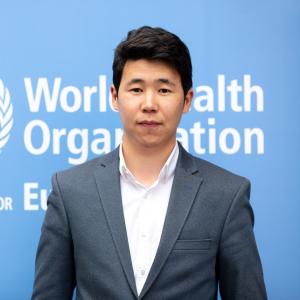The World Health Organization (WHO) continues to provide Technical Assistance to Kyrgyzstan in building COVID-19 pandemic preparedness and response measures
15 April 2020
BISHKEK, Kyrgyzstan – Due to the unfavorable epidemiological situation and state of emergency, set in certain regions of the Kyrgyz Republic, the WHO calls the population to act responsibly and follow the instructions of the state bodies, and also reminds people of basic precautions to contain the risk of infection or the virus spread, including avoiding close contact with other people, keeping at least one meter away from the sneezing and coughing people, and regular hand washing.
WHO also reminds that people with sickness symptoms should cover their nose and mouth with a bent elbow when coughing and sneezing, or use paper tissues, which should be immediately thrown into closed garbage cans.
Currently WHO Country Office in Kyrgyzstan works shoulder to shoulder with strategic partners, Kyrgyz Republic Ministry of Health, and all other public governance structures, Development Partners and continuously coordinates the response activities in connection with COVID-19 pandemic in the country. The main areas of cooperation are listed below:
WHO coordinates with National and Development Partners
- Under the overall leadership of the WHO country office in Kyrgyzstan, an intersectoral interdepartmental preparedness and response plan for COVID-19 in the Kyrgyz Republic was developed for the next 12 months with a total amount of approximately $ 16 million allocated by donor organizations in the country to combat COVID-19 in Kyrgyzstan. The overall goal of this preparedness and response plan is to support the Government and Ministry of Health in leading and providing an effective, timely and coordinated response that will reduce the impact of the outbreak of COVID-19 in Kyrgyzstan.
WHO assures supplies of Laboratory Kits and Personal Protective Equipment
- 2,600 test kits were delivered to the country in February and March as part of enhanced preparedness and to provide quick detection and response to a possible outbreak.
- Early in February, based on a request received from the Ministry of Health, the WHO Country Office in Kyrgyzstan locally procured 2,000 alcohol-based hand sanitizers; 5,000 masks; 5,000 gloves for health professionals, who face increased risks in the frontline of combatting the disease.
- In the mid of March, WHO in partnership with USAID handed over the personal protective equipment to the Ministry of Health. It included 10,000 surgical masks; 10,000 gloves; 1,400 gowns; and 200 protective goggles, and 200 face masks type FFP2. The shipment was dispatched from WHO’s regional logistics hub in Dubai.
WHO improves the capacity of health workers and strengthens the role of laboratories
- In the mid of April, e-learning training cycles in diagnosis of COVID-19 coronavirus infection were completed in Kyrgyzstan for 96 laboratory specialists. This distance training has engaged the local Polymerase Chain Reaction method (PCR) experts from the National TB Center, AIDS Centers, Republican Center for Quarantine & High Pathogen Infections, State Centers for Sanitary and Epidemiological Surveillance of Bishkek, Jalal-Abad, Osh, Issyk-Kul regions and private laboratories. The main goal of the e-learning courses was to train laboratory specialists in the basics of Biosafety in laboratory settings and in working with high pathogen and dangerous materials.
- Early in February, over 310 health workers from Intensive Care Units, Republican Infectious Diseases Hospital, PHC Centers and 2 Military Hospitals attended the 2-day specialized training in Clinical Management of COVID-19 patients. It provides technical assistance to the labs in Kyrgyzstan to get ready for COVID-19 testing; arranges referral of positive samples to the WHO Regional Reference Laboratory in England for confirmation and phylogenetic tests of Coronavirus, circulating in Kyrgyzstan.
- To the effect of COVID -19 cases detection and epidemiological surveillance of suspect cases- the Rapid Response Teams on epidemiological investigation and contact tracing down were equipped and trained; a cycle of e-trainings was provided for clinicians; trainings educational materials and programs on COVID-19 for healthcare professionals were revised.
- A series of simulation exercises were held at the “Manas” International Airport to improve the skills of service personnel in COVID-19 response in collaboration with the Kyrgyz Republic Ministry of Health, other key Ministries and WHO. These exercises enabled the country to analyze the emergency response area.
- WHO, in close collaboration with the Kyrgyz Republic Government, UN Resident Coordinator’s Office, USAID, CDC, British Embassy, Embassy of France (on behalf of EU) conducted the Multi-Agency Operational Needs Assessment of readiness to manage the new COVID-19 with the aim of assessing the existing capacities and emerging needs of national institutions.
- WHO constantly provides the Kyrgyz Republic Ministry of Health and technical experts with updated evidence, recommendations, WHO guidelines on prevention, laboratory diagnosis and treatment of COVID-19. Кроме того, ВОЗ предоставила техническую стратегическую поддержку для пересмотра алгоритма и протоколов в соответствии с руководящими принципами ВОЗ.
Risk communication
- WHO, together with the Kyrgyz Republic Ministry of Health, has adapted WHO risk communication materials and distributed printed materials to the general public throughout the country. Particular attention is paid to the airport's sanitary checkpoints and ground entry points.
Information: this assistance is provided as part of the joint humanitarian response under the Disaster Response Coordination Unit, which was activated on 16 March 2020 following the request of the Government to assist her in emergency preparedness and response for COVID-19 and setting a stage for early recovery. Chaired by the UN Resident Coordinator, the DRCU prioritizes and channels its support under six priority sectors: early recovery, education, food security and logistics, health, protection, and joint sector for water sanitation and hygiene (WASH) and non-food items (NFI). The DRCU was set up in 2008 and its inter-agency teams comprise representatives of government ministries, UN agencies, international and local NGOs and representatives of donor community.


